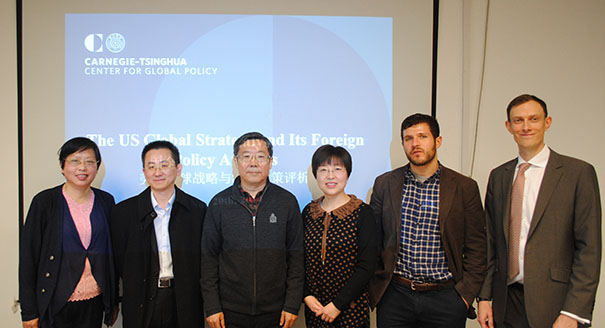{
"authors": [
"Zhang Lihua"
],
"type": "event",
"centerAffiliationAll": "",
"centers": [
"Carnegie Endowment for International Peace",
"Carnegie China"
],
"collections": [
"China’s Foreign Relations",
"U.S.-China Relations"
],
"englishNewsletterAll": "",
"nonEnglishNewsletterAll": "",
"primaryCenter": "Carnegie China",
"programAffiliation": "",
"programs": [],
"projects": [],
"regions": [
"North America",
"United States",
"East Asia",
"China"
],
"topics": [
"Foreign Policy",
"Security"
]
}
Assessing U.S. Global Strategy and Foreign Policy
Thu, November 20th, 2014
Beijing
The United States still exerts tremendous political, economic, and cultural influence worldwide. However, in recent years, U.S. efforts to promote the country’s values overseas have produced mixed results in the Middle East, Asia, and Latin America. What factors have contributed to this trend, and how are U.S. policymakers adjusting their foreign policy strategies and public diplomacy efforts in response?
Carnegie–Tsinghua’s Zhang Lihua hosted a discussion about how U.S. global strategy is evolving in the face of these challenges. Discussion participants included Zhang Minqian of the China Institute of Contemporary International Relations, Wang Rongjun of the China Academy of Social Sciences, Xing Yue of Tsinghua University, Isaac Kardon of Cornell University, and Carnegie’s Nicholas Wright.
Discussion Highlights
- Contradictions in U.S. Global Strategy: Participants agreed that there are sometimes tensions between different aspects of U.S. policy, such as counterterrorism and energy security. External crises like those in Ukraine and Syria, reduced defense spending, and the domestic politicking of the November mid-term election have all constrained U.S. policymaking. Panelists suggested that measured U.S. responses to the Islamic State and Russian assertiveness in Crimea reflect this reality. They recommended that the United States cultivate multilateral ties to manage the country’s eroding global influence.
- Recalibrating Foreign Policy: Panelists drew contrasts between the foreign policy of President Barack Obama and his predecessor. They pointed out that Obama has striven to restore Washington’s global image after two costly wars and the 2008 financial crisis. His administration has focused on fostering closer global trade ties and strengthening partnerships with traditional allies from the UK to Japan. The U.S. pivot to Asia has increased both U.S. attention and resources to the region, although panelists acknowledged that the policy has also triggered mistrust from Beijing. Despite these tensions, events like the APEC summit and the RIMPAC naval exercises demonstrate that bilateral U.S.-China relations are largely constructive. In contrast, they added, the Middle East continues to pose acute challenges to U.S. foreign policy.
- Preserving Economic Influence: Panelists asserted that primary U.S. economic interests include maintaining the dollar’s value and the country’s advantageous position in the global economic order. Fostering an ongoing worldwide recovery from the 2008 financial crisis is also a priority. They suggested that the Obama administration has endeavored to preserve U.S. global influence as embodied in institutions like the IMF and World Bank, rather than to restructure these entities to reflect the growing power of China and other emerging economies. The United States is also seeking to deepen worldwide trade ties through negotiations on the Trans-Pacific Partnership and the Transatlantic Trade and Investment Partnership. Panelists posited that U.S. engagement through the G20 is meant to reassure trade partners of Washington’s commitment to economic globalization.
- Ensuring Maritime Access: Participants suggested that the most consistent feature of U.S. global strategy is its coherent, explicit maritime objectives. The panelists stressed Washington’s emphasis on maintaining open sea trade routes and market access, demonstrating commitment to allies, and reinforcing U.S. naval power projection capabilities, particularly in the Asia-Pacific region. Citing tensions stemming from maritime territorial disputes, they discussed the U.S. strategic and diplomatic rationale for remaining neutral on these issues and encouraging peaceful multilateral resolutions.
- Promoting U.S. Values: Participants noted that values hold a prominent place in U.S. history and foreign policy. They discussed the high priority that the United States has placed on ideology in framing the country’s interests and policies abroad. Panelists suggested that a leading reason for this might be widespread adherence among U.S. policymakers to democratic peace theory, which posits that democratically governed countries rarely to go war with each other. Participants concluded that this impulse was a leading motivation to U.S.-led interventions in Iraq and Afghanistan.
Zhang Lihua
Zhang Lihua is a resident scholar at the Carnegie–Tsinghua Center for Global Policy, where she examines how China’s core values affect Chinese foreign policy. Zhang is also director of the European Studies Center at Tsinghua University’s Institute of International Studies. Her other research interests include political theory, European politics, and contemporary Chinese politics and diplomacy.
Carnegie does not take institutional positions on public policy issues; the views represented herein are those of the author(s) and do not necessarily reflect the views of Carnegie, its staff, or its trustees.
Event Speaker
Zhang Lihua
Former Resident Scholar, Carnegie-Tsinghua Center for Global Policy
Zhang Lihua was a resident scholar at the Carnegie-Tsinghua Center until June 2020.
